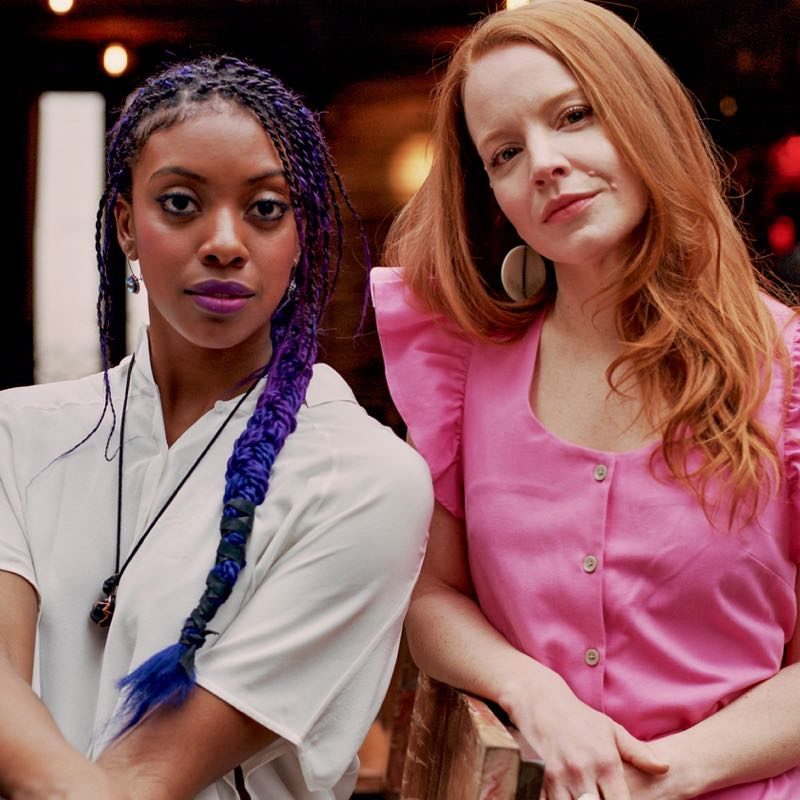Lauren Ambrose and Condola Rashad in Conversation
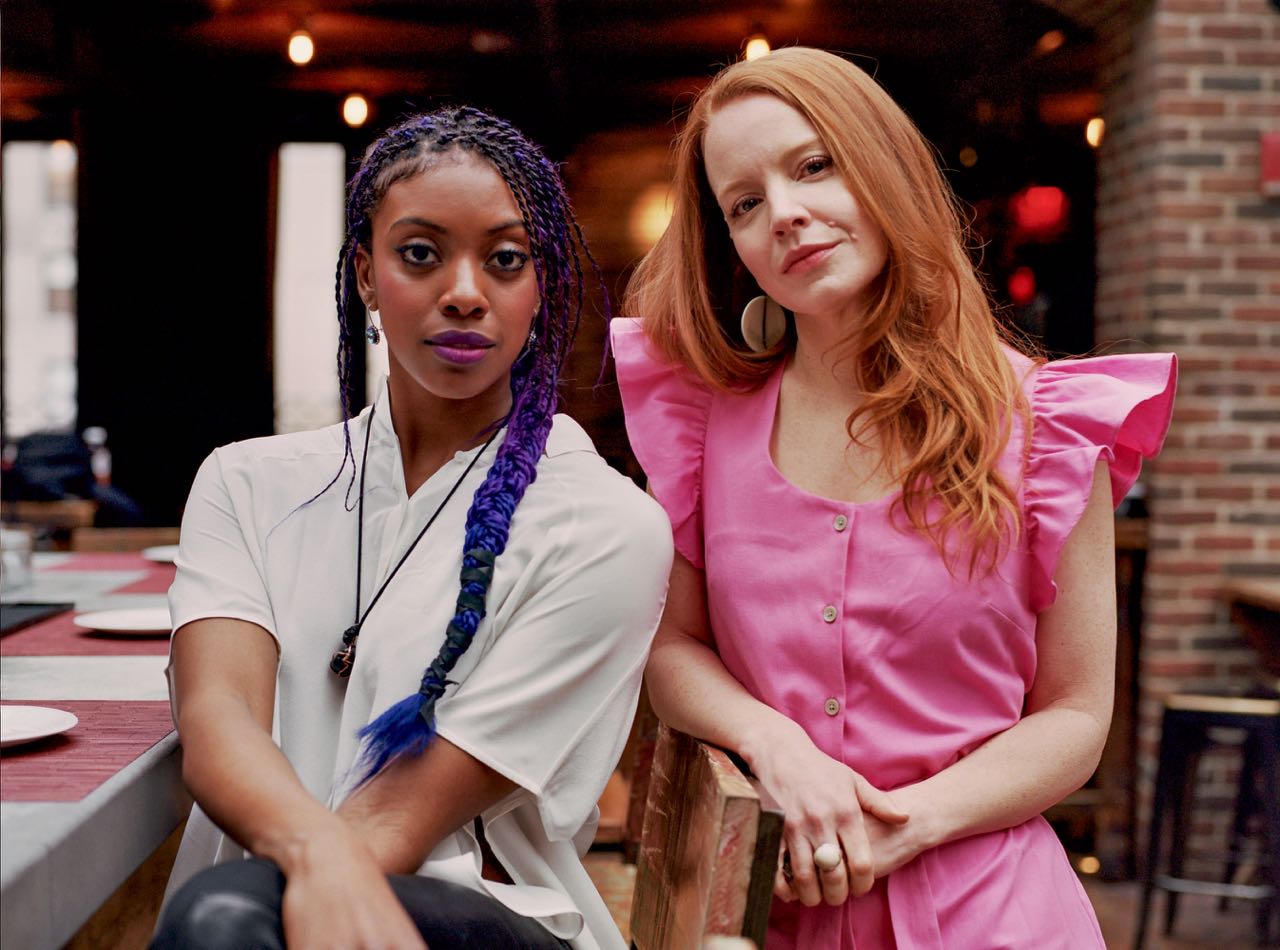
Written by Victoria Myers
Photography by Jacqueline Harriet
May 8th, 2018
You have probably heard of Eliza Doolittle and Joan of Arc—the fictional street urchin turned aristocratic lady and the 15th century French farm girl turned warrior and Saint and then fictionalized character—who are the female leads in George Bernard Shaw’s Pygmalion (and in the Lerner and Loewe musical adaption, My Fair Lady) and Saint Joan, respectively. But how much do you really know about them? Maybe, if you think about it, you just know the CliffNotes version of Joan and that one monologue that makes its way into the hands of teen girls at theatre camp? And maybe, if you think about it, you’ve actually only seen My Fair Lady once—the movie version—during your Audrey Hepburn phase. Of course, by “you” I mean “me,” but my guess is that I’m not alone; that for all we think we know about them, these infamous characters of the theatre have remained enigmatic.
Now they’re both back on Broadway. Eliza, played by Lauren Ambrose in the Lincoln Center Theater production of My Fair Lady, and Joan, played by Condola Rashad in the Manhattan Theatre Club production of Saint Joan. Both have brought unique interpretations to their roles—which is, for an actor, the definition of doing well at the job—and both, prior to their shows beginning performances, were met with people insisting they knew what the roles were. There is always a certain amount of that in playing any classic role, but this year, the outside commentary was louder than normal. As the entertainment industry reckoned with the treatment of women in the workplace—and the theatre industry nodded along, occasionally—the subject of how (and if) to do certain roles in 2018 bubbled to the surface, particularly in the case of My Fair Lady. And then, there was the added fact that both shows are directed by men (the direction of classic plays and musicals has continuously been an example of major gender inequity).
These are all questions of agency: How much agency does Eliza have? How much does Joan have? And where does that agency come from? And then, there is the matter of the actresses: how much agency are they given—by the creative teams, by the audience, by the media—to play the roles as they see them? And what does it mean to be the person in the title role, to be the person whose photo is used in articles asking, “Should it be done,” and about the men who are doing it (I couldn’t tell you what the majority of male directors looked like) in 2018?
Shortly before they were both nominated for Tony Awards, I sat down with Lauren Ambrose and Condola Rashad to discuss how they brought Eliza and Joan to life in 2018, and about women and agency—both for their characters and themselves.
I’m sure everyone on the planet has been telling you that these are both very well known roles. What was your way into the parts? And, going along with that, did you feel like you had to come into rehearsal on the first day with a very strong sense of your “take” in a way that was maybe different than in the past?
Lauren: I love rehearsal. That’s my very favorite thing. And I love working with the people I’m working with, especially [director] Bart Sher. It’s indeed an iconic role, but we talk Keats a couple times in the musical, and Keats has this thing about negative capability, where he says it’s defined as being open to uncertainties and mysteries without the irritable grasping after fact or reason. So, that’s my theme in rehearsal: being absolutely open to what the people and the group inspires. It is just such a talented group of artists and I’m so amazed by their artistry, so I feel like we’ve created something interesting and new.
Condola: I also really love rehearsal. Rehearsal really is the best part because it is your child there and you get to be able to create with other people involved. We never really stop exploring. Even now, in performances, last night we completely unearthed a whole other side of the play that we’re like, “Oh, so that’s there.”
Lauren: That’s interesting. I felt like we had a really new level of performance last night too.
Condola: In this particular play, I think the other added level is that the character is based on someone who is quite iconic and existed in the flesh. And so, for me, how I went about this was when I first got this role back in the fall, I actually put the play aside for about two months and I went and I just researched Joan as if I was writing a thesis on her. That was incredibly helpful, because no matter what I ended up creating on my own, there was a route that I could see, and I can see what people said about her, I can see what she said about herself. It helped me to understand who the human being was so that I could grow from there, and I was really moved by that. In terms of the take, I didn’t necessarily try to do anything different from anybody, I just did what felt right for me and also what I felt reflected my research that maybe I hadn’t seen in other portrayals. I feel like with Joan of Arc there sometimes can be this need for her to be a mad woman, because it’s easier for people to digest her story if we can just accept her as a mad woman. When I did my research, it was very clear to me—whether anybody believes what she said, that’s up to everyone’s interpretation—but no matter what, the way that she presented herself and the way that others say that she presented herself was nothing like a mad woman. There’s nothing mad about her. She’s actually quite clear, and that was very inspiring to me. Another reason why she was such a threat was actually because she was so clear, and that was very threatening. That was really moving to me: the idea of a woman that was so powerful, but she wasn’t powerful because she was angry and she wasn’t powerful because she invoked fear of people. People loved her. People were moved by her. And that was something that I was really excited to explore.
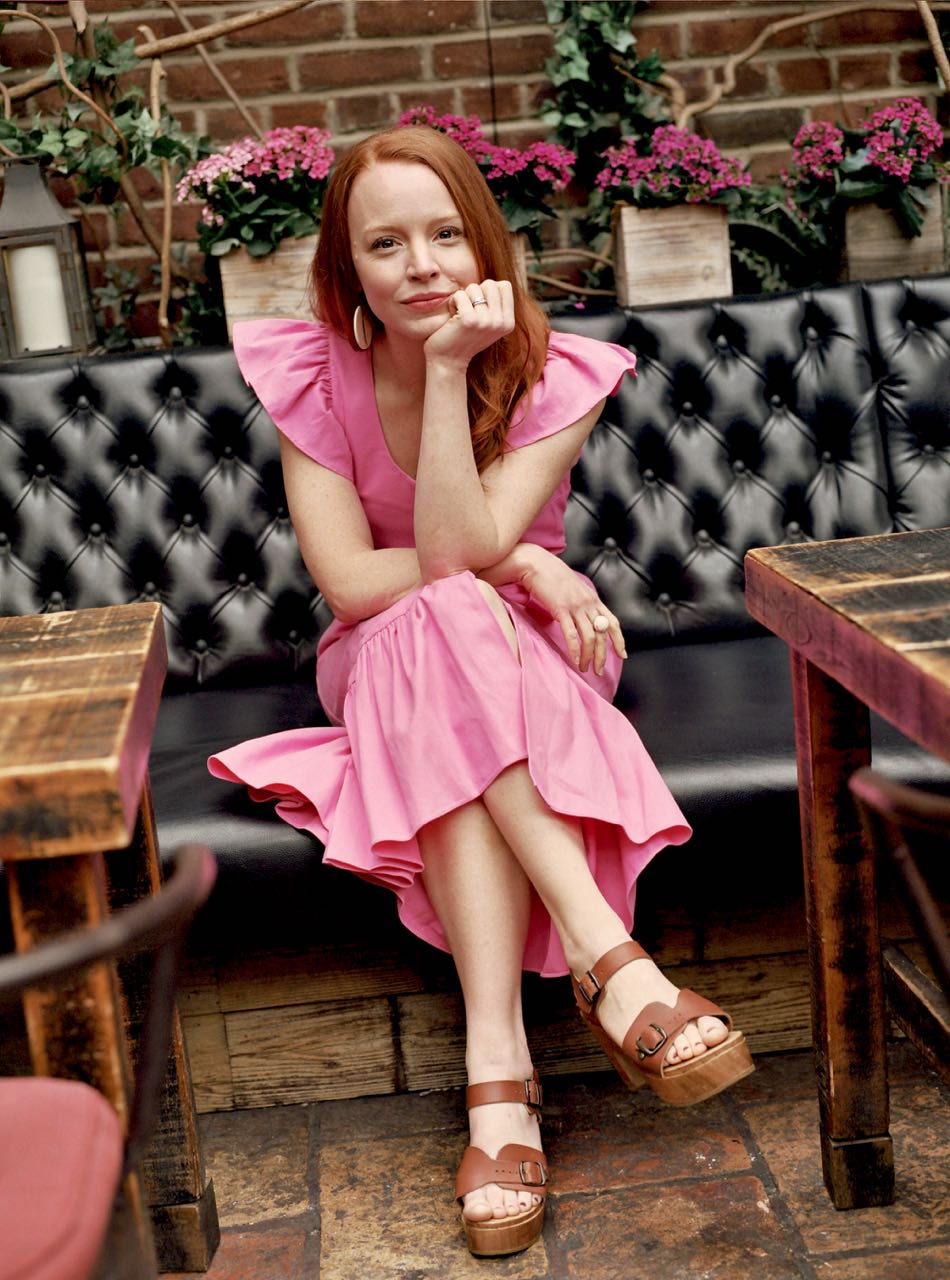
Both of these roles deal with women and their agency or lack thereof, and both the agency that they find they’re able to give to themselves or the agency that they need to be given by other people. What was your thought process like for exploring that?
Lauren: The play has been described as this story about a man who transforms a woman into his ideal version of a woman or turns this troubled gutter child into a lady. But really, what was striking and moving to me when I first read it is that she hears this guy talking about language and how that could change people’s lives. She hears about this in Covent Garden, and she hears this guy talking unlike anybody else, and then she has the guts to go to his house and ask for lessons. She starts the trajectory of the plot in that moment by her bravery of showing up at the house. Even though she’s totally out of her depth and out of her class and her realm, she shows up at this fancy, fancy house and says, “I’m here for lessons,” because she has a couple of coins that he tossed at her, [so she thinks], “I’m going to use this money to change my life.” And that’s very, very moving to me. And so, we’ve tried in our production to draw that out—that starts the character’s journey toward transformation.
The other thing is I feel that the transformation of this character is not when she goes to the ball and becomes a princess, but it’s actually in the second act after the ball when she goes, “Okay. I did that. I was able to do that. Now what? Now what will I be? What will I be now that I have the mannerisms, the affects, of a lady? I’ve got what I wanted, so where do I fit in in the world? What will I do with this?” That’s when she really has to find her strength and power, and it’s really a crucible there of how she’s this Frankenstein person who doesn’t fit in anywhere. She’s like a woman without a country because she doesn’t belong anywhere anymore, and all she can really do is go get married, and that would, of course, lower her status. There’s a line in there where she’s saying, “Well, what am I to do? What am I to do?” And he says, “Well, you know, you might marry. You could go get married, of course.” And I’m realizing now, in playing it this week even, that it’s sort of that recognition of, “Oh my God. Oh my God. That’s what this was all about.” And at that moment in time, the only option for a woman of a certain stature was to go off and get married and that was it. So she has to figure something else out of what she’s going to do and that’s what we’re trying to do in our version of this play.
Condola: Well with Joan, the way that that play is set up is she’s literally surrounded by all men.
Lauren: Yes. Same thing. And often, even in the rehearsal room, I would imagine.
Condola: Totally, yeah.
Lauren: The Assistant Director and I were often the only women in the room.
Condola: Yep. Our Stage Manager, the AD, and our Assistant Stage Manager, and I [were often the only women]. It’s funny, because I feel like a lot of people asked me after the rehearsal, “How was that, being the only woman in the room?” And I feel like there was already a shadow of like, “Oh, God. That must have been a lot.” And interestingly enough, there was something very heartwarming about this particular experience, and something very healing about it, actually, because I was surrounded by all of these wonderful men who were there to build this with me and were so open and so loving and so giving, and we were there to work, which is very apropos to the story because I think a lot of the time, the main arc in people’s minds is that it’s Joan against the men of the world. The truth of the matter is, yes, in the trial, that is what ended up being the case, but you cannot forget about all of the men that fought with her, that she loved as brothers. She had just as many men that fought with her and helped her as people that brought her down. So it’s not necessarily a play about women versus men. It’s a play about the human spirit and how that is threatening to people. When someone is so full of conviction and so full of enthusiasm for life and their purpose—especially a woman, yes, that’s very threatening.
I think what really moves me about Joan is that she has every reason to be incredibly angry, but if you read the play, and with the research that I did, it doesn’t mean she doesn’t experience anger—obviously, she’s a human being—but what moves me is that she’s still able to find a way back to a level of compassion, because she just had that. That is what she had. That’s all she had, actually. That’s why she did what she did: for compassion for her fellow people. This is what was driving her. Her actions weren’t coming from a place of anger. And to me, a woman in that setting, to actually be driven from something else, that’s really hard to do. And I think that’s really, really powerful.
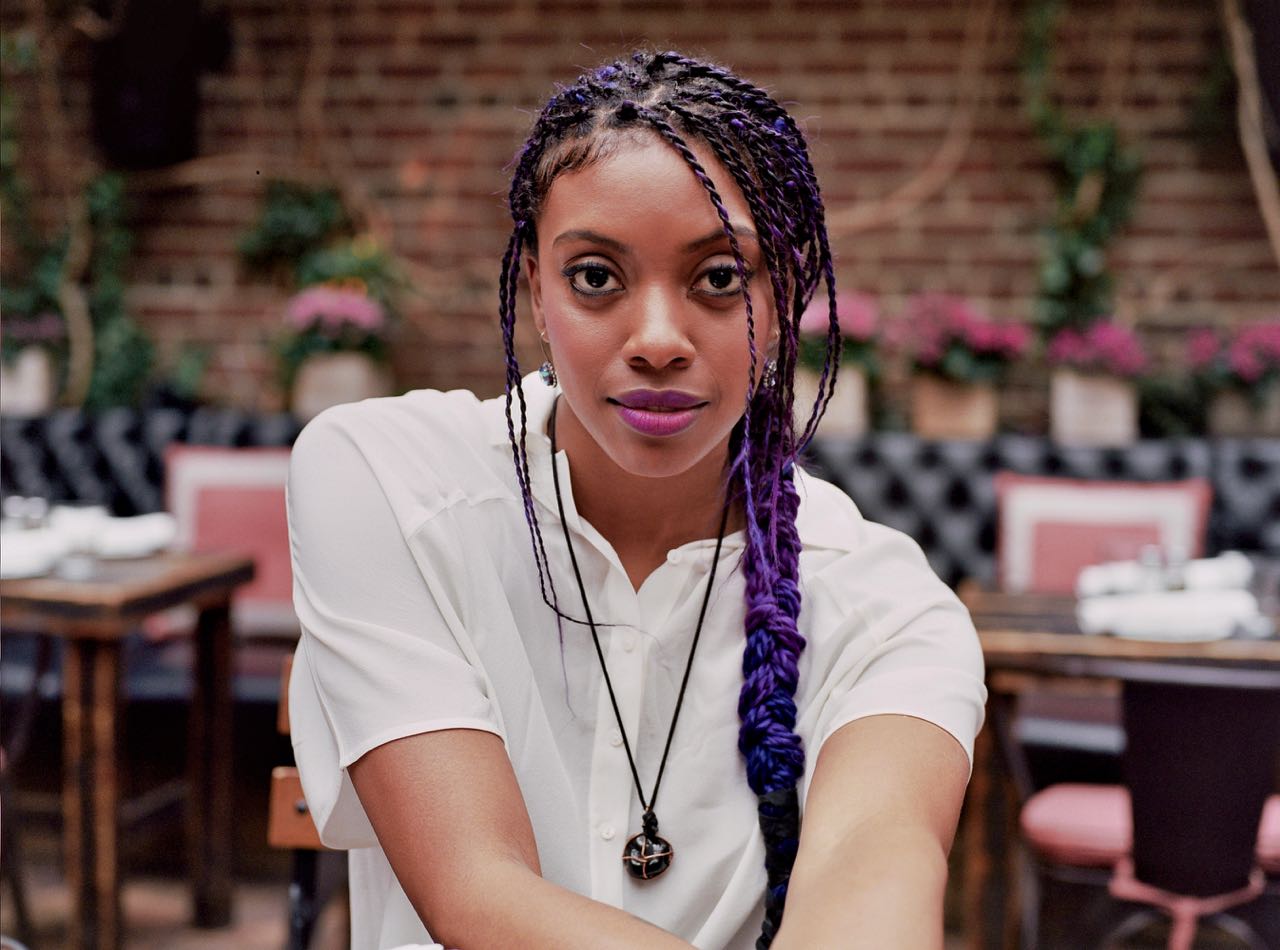
I’ve heard writers talk about how, if work is by women or about women, people tend to make it more about plot than theme—they just see it as about what happens rather than the metaphor or what’s happening on a deeper level. It sounds a little bit like that is something that you both have to contend with: this idea of it being about Joan who is angry and fights the men, or Eliza being controlled by men. Would you say that’s accurate and something you felt like you had to press against a little in order to be like, “No. This is a story about really big things going on with these people”?
Lauren: I’m telling a story, and of course, it’s going to be about more than that to me because I’m trying to embody this person as realistically and as fully as I can with all of my experiences and heart and soul. And of course, it’s going to seem like more than just the plot to me because I’m searching for all of that.
[I’d like] to speak on what Condola was saying before about the healing aspect of it. It was really interesting because, again, there were very few women in the rehearsal room or even in the play. Diana Rigg, of course, is pretty fierce and she’s a great, strong, woman to have there who’s also played Eliza and is connected to Shaw because she played Eliza she did the play with Shaw.
Condola: Oh, wow. That’s so cool.
Lauren: So, she’s like a direct chain and I’m in the receiving line of it. But Henry Higgins has to actually hear Eliza and he almost barely becomes transformed. The actor playing Harry Higgins, Harry Hadden-Paton, a beautiful actor, a beautiful person, and he’s very beautifully portraying this very difficult, wrenching transformation of seeing this person as a little more of an equal by the end of the play. And because you’ve got all of this music like “Why Can’t A Woman Be More Like A Man” and all of this stuff that you hear now as just like, “Oh God,” and it’s hard to believe it was written. But we’re seeing where we’ve come from in our history. We’re seeing the ideas that have shaped where we’re at now and pulling them apart in 2018 in the safe space of a theatre, which is a great place to have these kinds of discussions and to explore these ideas and look at, “What was it like for a woman in 1911? How did we get ourselves in the pickle we’re in now?” I feel like everybody’s learning in the play, including the audience. You get to act two and I feel, sometimes, they’re like, “Oh, this is sad. This isn’t just a musical comedy. This is something that’s exploring bigger, scarier ideas.” I feel honored to be making that discussion happen every night.
Condola: With Saint Joan, oddly enough, it’s kind of a reversal. I think a lot of people—and even the way that I grew up knowing about Joan—there’s this broad idea of who she was and what she stood for and then what happened to her. I don’t think most people actually know the details of what actually happened and who she actually was, and the fact that her entire rehabilitation trial is there—you can read it. So you can see what she said; you can see what they said. A lot of people don’t know all of that. They just know, “Oh, it’s this broad thing of this fierce woman.” Like I said before, because it’s a lot easier to pass her off as kind of a crazy person—that’s how she’s passed off, as this great, crazy person who led a bunch of people and then was burned at the stake. That, to me, is the overall understanding of Joan. And so, for me, it was the opposite. It felt like breaking away from what you think you know about Joan and just telling the actual story of what happened, because she already represents so many things. It wasn’t about trying to tell this story from the outside, but instead, “No. This is a story about a 17 year old girl who knew her purpose and served it.” My goal was to tell the human part of the story. We know her as a saint. We know her as a soldier. Who is she, though? Those are the things that we associate her with, but who is she? And who was she? And that was more interesting to me. And then you can attach anything you want at the end of it, but to me, it was more interesting to tell the actual story of the human being’s journey of being true to what she believed was her calling.
Lauren: And interesting that a woman with a clear voice has to be framed as hysterical and crazy.
Condola: So, that is my biggest thing with this. There’s a lot of people that really need her to be crazy. I felt this vibe, even in performing, there are certain people that are really moved to question, which they’re enjoying. And then there are some people that really, I can tell, there’s this need for her to be insane. And if she’s not insane, they don’t know what to do. Like, they don’t know how to receive the story unless she’s batshit crazy. And I think that that’s very interesting. So my biggest thing has been to stay true to what I learned. And it wasn’t just a personal choice of like, “I don’t think I want to make her that way.” It’s from what I went back and learned about her.
Lauren: You know, George Bernard Shaw was a—I’m going to say it—he was a feminist.
Condola: Yeah, in his own way.
Lauren: In the form that he was a Socialist and he was a Fabian, so he believed in equality for all. So therefore, he had to believe in feminism and he was a champion of Women’s Suffrage, he was a champion of reversing the sodomy laws. There was so much going on at the time when he was in his power and writing all of his big work. He wrote, interestingly, all of these really strong women.
In Pygmalion, Eliza leaves. He wrote it to be a feminist piece and a way of looking at not just gender, but class. I would imagine that Saint Joan probably talks about class, too. I’m not as familiar with that play. But I would imagine that it has to do with the fact that this is not only a young girl, but a poor young girl.
Condola: Yeah, and the institutions that she was up against. The aristocracy and the Church were like, “Nope. This isn’t going work for us.”
Lauren: Right? That’s very threatening.
Condola: Very threatening—can’t have people walking around thinking that they could have a connection to God themselves without permission. That’s not going to work.
Lauren: George Bernard Shaw was writing these amazing women at a time when so much was shifting.
You both brought up that the creative teams for the shows are made up almost entirely of men, which there’s been a lot of talk about. It’s 2018, and I’m sure we can all agree that we want women to have opportunities to work on Broadway. So this is not that question. You’re both playing the title roles in these shows, which means you have a big creative contribution to what’s going on. Do you feel like, as part of those conversations, you have been given creative agency? What do you feel like your roles in those conversations have been? Do you feel like it’s been big enough?
Condola: When this project came my way, I became really excited about it, but before I even jumped on board, I have learned from the past to see who else is involved, who’s directing. You’ve got to make sure that the people surrounding the thing are right. When I met with [director] Dan Sullivan, I became so excited because I felt, immediately, that this was going to be a room where we have a fantastic director to lead us, but also—and this was true in our rehearsal room—someone who listens. Someone who’s listening and open. Sometimes just as an actor, but maybe also as a woman, I would notice certain things and be like, “Okay, maybe if we could not cut that because I feel like that’s important to hear.” And it was always like, “Yeah. Okay. Great. That sounds great.” I felt really free to bring everything that I could and support it. That’s what I meant by healing, as well. I felt like these are men who are supportive of this story coming to life. So it was great.
Lauren: In doing an antique piece, it’s scary because you don’t know what you’re going to unearth—especially right now. I would definitely not want to be doing this musical with anybody other than Bart, because he is a very searching person. He leaves no stone unturned and we were very much on the same page. One of the first things I said to him was, “What are we going to do about the ending?” And he’s like, “Don’t worry. We’re going to work it out.” And he did. We hashed it out and we worked it out and we came up with something that’s right and good and puts the play right into the future and frees Eliza into the future. I felt like it was a very collaborative room. There’s no other person I’d rather do this play with. I’d be afraid to do it with others. He surrounds himself with amazing people—even our Assistant Director, Maggie Burrows, was wonderful to work with—she’s a very cool young director. I was just always trying to champion Eliza, but so was he, even in the staging of how we used the thrust. It’s a thrust—it’s not a proscenium—so how do we tell the story when I’m on stage or when I’m sort of drifting around or when I’m stepping where? In interstitial moments between scenes, we cut to her thinking, so we can get inside her thoughts a little more. So, all of that was really fun to find and discover. It was awesome.
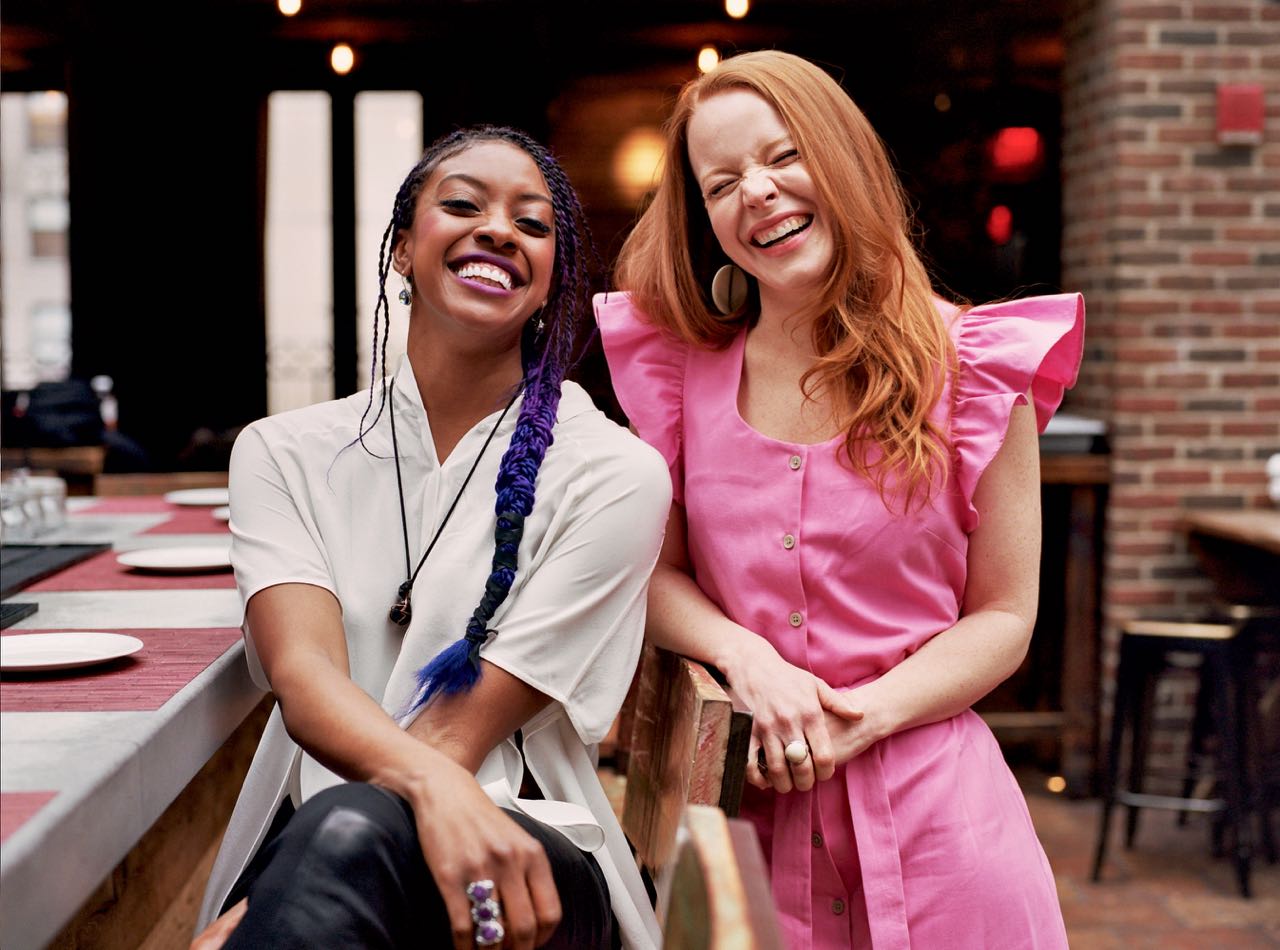
Both of you started acting at a fairly young age. Lauren, you started acting professionally as a teen and Condola, you grew up with a mother who was an actress, but also started pretty much right out of school. How have you both managed in an industry that, especially with women, is so into telling you who you are and what you’re good at and typecasting, and with how women are described in breakdowns? How does all of that affect you as a person who is developing as an artist and a human being?
Lauren: Following my heart and seeing how I feel about a project and actually listening to whether I feel it’s something I want to be a part of, or the people I want to [work with], or kinds of stories I want to tell. I try to not do anything that I’d be ashamed of my daughter seeing. I have a five year old daughter and an 11 year old son and I don’t want to really be involved in anything that makes me feel like they would [be ashamed].
Condola: You kind of just have to navigate through it. I went to CalArts for college and the one thing I can say is that it doesn’t really matter what school you go to. My experience at my school, however, was I think really, really imperative, because I went to a school where instead of them just focusing on, “Okay. This is what you’re going to be when you get out of here, so we’re just going to prepare you for that,” which I think drives a lot of people nuts, my school was actually like, “Okay. We don’t really care what they’re going to typecast you as once you leave these walls. The whole point of you being here for four years is go farther and see everything that you’re capable of so that when you get out there and when they try to put you in a box, even if they do, you know what you’re capable of doing, so you never lose sight of your artistry.” I think that the lesson for me with that was that while navigating through all of these things that you mentioned, I don’t ingest them into my being so that I become bitter. I just see them, and I just say, “Okay. No. No,” or, “Yes. Yes.” And I go, “Okay. That’s what they think they want. That’s fine. And then I’m going to come in here and I’m going to do what I do, and if it’s right, then I’m going to get it.” You have to just walk into every room knowing what it is that you carry and what it is that you do. Don’t worry about what they say. Just do what you do.
Lauren: I really believe that the projects that I do, I do for a reason. I actually have something real to learn from them. And not even in a “woo-woo” way, just in a very practical way of, “Okay. This has come to me, and if I put myself into it and I really ask the questions that the play is asking, I’m going to transform, too.” And like, for Eliza it’s basically: what does she shed to count herself as an equal? She gets this veneer of the language and posture and all the things of a lady, but what is it to actually be a lady in her strength? And it’s something that I feel like I’m learning still.
I have learned a lot since I started acting, and I’m learning every day, and I learn with my children and my husband and as a mother and as an artist, and it’s a constantly evolving thing. But it’s taking each moment and saying, “That feels right,” or, “That feels wrong.” The collaborators you choose to work with are incredibly important. Someday, I believe, it will not be right for them to send me a cover sheet that says, “Such and such role, series regular, nudity required.” How is it possible? Are you looking for an actor or are you looking for…? I know male actors are treated badly too, but I just feel like that’s got to go: “Must be comfortable with nudity,” or something like that. And I feel like that will show up every once in a while.
Condola: Yeah, that does show up.
Lauren: And that one always floors me because it’s like, “Well, what’s important? The artistry?”
Condola: Or the nudity?

